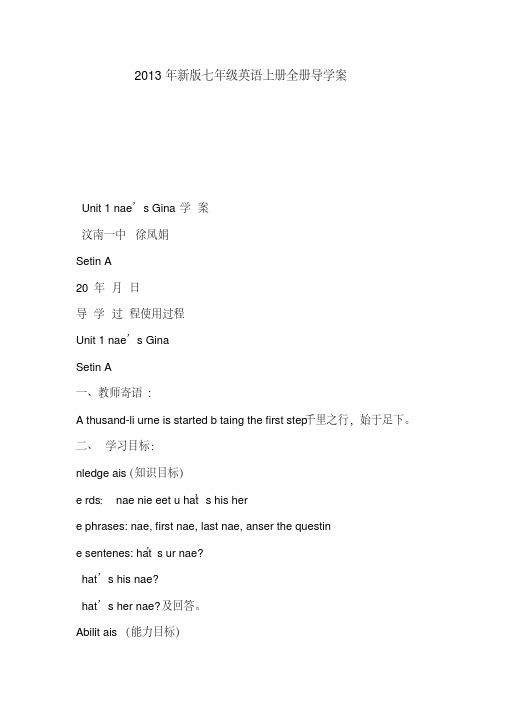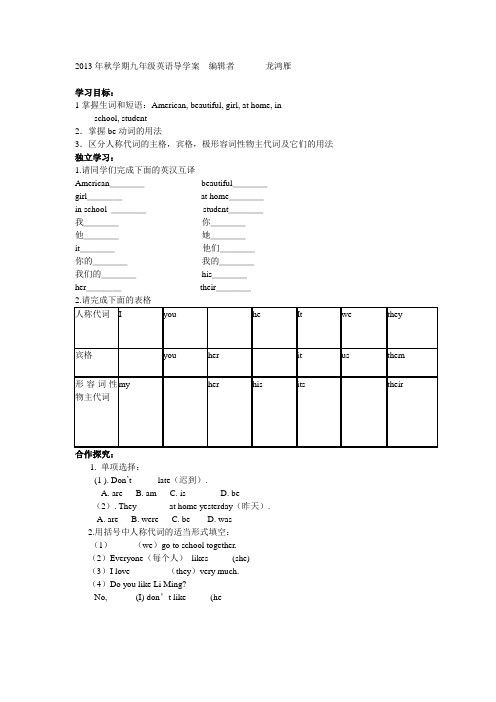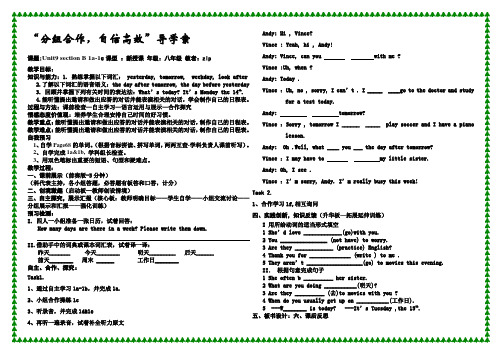英语导学案.20130209
- 格式:doc
- 大小:112.00 KB
- 文档页数:14

2013年新版七年级英语上册全册导学案Unit 1 nae’s Gina 学案汶南一中徐凤娟Setin A20 年月日导学过程使用过程Unit 1 nae’s GinaSetin A一、教师寄语:A thusand-li urne is started b taing the first step千里之行,始于足下。
二、学习目标:nledge ais(知识目标)e rds:nae nie eet u hat’s his here phrases: nae, first nae, last nae, anser the questine sentenes: hat’s ur nae?hat’s his nae?hat’s her nae? 及回答。
Abilit ais(能力目标)1.掌握简单的问候语,并能自我介绍,初步培养用英语进行交际的能力。
2.掌握听的技能,在听的过程中准确获取数字信息。
ral ais(情感目标)礼貌待人,培养良好的人际关系。
三、教学重难点介绍自己,问候他人。
四、学习过程1、预习导学及自测英汉互译1nae_________ 2好的,令人愉快的______________3t___________ 4遇见______ ur____________6 his____ _____ 7她的名字______2、自主学习①.ne nu 1, 一:ne and t aes three 一加二等于三。
ad ①一个:I have ne b 我有一本书。
②有一(天):ne da he ill understand u 有一天他会理解你的。
②eet/i:t/ v 遇到,碰到【记忆法】-ee-双写,与eat 为同音词。
【考点】t eet sb (r sth )遇到某人/某事:Nie t eet u 初次见面时的客套话,不是初次见面时则用see。
【引申】eet 也可用作名词,译为:会,集会:sprts eet 运动会。


Unit5 Do you want to watch a game show?Section B 2a-2e(第4课时)主备人:覃红审核人:张课时:1 编号:24 授课人:班级:小组:姓名:【知识目标】:1. 会读会背单词: meaningless, culture, famous, appear, become, rich, successful, might, main,reason, common, film, unlucky, lose, ready, simple,2. 学习掌握短语:come out, be ready to, a pair of, try one’s best to do sth, be ready to do sth, a pairof, look like, be like, a symbol of, as famous as,【情感目标】:学会如何正确交友,树立正确的择友观。
【能力目标】:学会用英语表达自己的择友观点,学会用英语与同学交流自己对交朋友与及现代生活中新事物的看法【学习重点】:学习运用恰当的形容词进一步喜欢或者不喜欢某种电视节目和电影的原因。
【学习难点】:阅读部分2b,注意对2b中的文本的理解【课型】:阅读+ 展示+ 反馈【学习过程】:一、自主学习,整体感知I. 写出下列短语。
1. 动作电影________________2. come out ___________3. 其中一个重要原因________________4.一双/对________________5.设法做某事6.例如7. 乐于做某事 8. 尽某人的最大的努力二、合作交流,文本探究1.小组合作完成2a2.读懂3a 短文,完成题目要求。
3.小组讨论短文意思,然后全班交流,教师点拨。
4.再读2a小短文,完成2c&2d.5.小组讨论2e,组长负责核对,教师抽查并指点。
三、知识点拔:1. one of the reasons:one of 意为“……之一”,后面跟复数名词。

Unit 13 Rainy days make me sad精美导学案【课题】 Unit 13 Section A 1a-Grammar Focus ( 1课时)【学习目标】 1. 学会谈论或询问事物对人的影响,或人对某一件事或物的看法。
2. 理解动词make的用法,并能在实际情境中运用。
【重点、难点】1. 学会谈论或询问事物对人的影响,或人对某一件事或物的看法。
2. 理解动词make的用法,并能在实际情境中运用。
【导学指导】温故知新大脑风暴。
回忆表示感觉的形容词,如: happy, sad . 各小组竞赛,看哪个小组写得最多?自主互助学习一、自主预习1. 译译,读读,记记1) rainy days 2)awful pictures 3) soft music4) loud music 5) tense 6)uncomfortable2. 弄懂听力1b, 2a, 2b的听力要求。
二、听力训练1. 1b 先明确本题的要求,再听录音内容完成句子空格。
2. 2a 先看懂插图内容,再认真听录音,根据录音内容,把图片编顺序号。
3. 2b 先理解每个句子的含义,再听录音内容,完成任务。
三、合作探究1. 小组讨论交流1a的问题及答案。
2. 小组合作完成1c, 2c的对话练习。
3. 动词make的用法1)make +n. make food m ake a planemake the bed make money2) I just made it to my class. (Unit 9)我恰好赶到班级。
(arrived in time)3) make sb. / sth. + adj. 使某人(感到)…eg. (1)Soccer makes me crazy. 足球使我疯狂。
(2)The soft music makes Tina . 轻柔的音乐使Tina快睡着了。
4) make sb. / sth. + do …使某人做某事eg. (1)Wars make the peace go away. 战争使和平远离。

“分组合作,自信高效”导学案课题:Unit9 section B 1a-1e 课型 :新授课 年级:八年级 教者:zlp 教学目标:知识与能力:1. 熟练掌握以下词汇: yesterday, tomorrow, weekday, look after 2.了解以下词汇的语音语义:the day after tomorrow, the day before yesterday 3. 回顾并掌握下列有关时间的表达法:What’s today? It’s Monday the 14th .4.能听懂提出邀请和做出应答的对话并能表演相关的对话,学会制作自己的日程表。
过程与方法:课前检查—自主学习—语言运用与展示—合作探究 情感态度价值观:培养学生合理安排自己时间的好习惯。
教学重点:能听懂提出邀请和做出应答的对话并能表演相关的对话,制作自己的日程表。
教学难点:能听懂提出邀请和做出应答的对话并能表演相关的对话,制作自己的日程表。
自我预习1、自学Page68的单词。
(根据音标拼读、拼写单词,两两互查-学科负责人课前听写)。
2、自学完成1a&1b, 学科组长检查。
3、用双色笔标出重要的短语、句型和疑难点。
教学过程: 一、课前展示(前奏版-5分钟) (科代表主持,各小组答题,必答题有板答和口答,计分)二、创境激趣(启动板—教师创设情境) 三、自主探究,展示汇报(核心板:教师明确目标——学生自学——小组交流讨论——分组展示和汇报——强化训练)预习检测: I. 四人一小组准备一张日历,试着回答: How many days are there in a week? Please write them down.II.借助手中的词典或课本词汇表,试着译一译:昨天_______ 今天________ 明天_________ 后天______前天________ 周末 ______ 工作日________自主、合作、探究:Task1. 1、通过自主学习1a-1b ,并完成1a. 2、小组合作操练1c 3、听录音,并完成1d&1e 4、再听一遍录音,试着补全听力原文 Andy: Hi , Vince? Vince : Yeah, hi , Andy!Andy: Vince, can you with me ? Vince :Uh, when ? Andy: Today . Vince :Uh, no , sorry, I can’t . I _____ ____go to the doctor and study for a test today. Andy: tomorrow? Vince :Sorry , tomorrow I ______ _____ play soccer and I have a piano lesson. Andy: Oh .Well, what ____ you ___ the day after tomorrow? Vince :I may have to my little sister. Andy: Oh, I see . Vince :I’m sorry, Andy. I’m really busy this week! Task 2. 1、合作学习1f,相互询问 四、实践创新,知识反馈(升华板—拓展延伸训练) I 用所给动词的适当形式填空 1 She’d love _____________(go)wit h you. 2 You ________________ (not have) to worry. 3 Are they _____________ (practice) English? 4 Thank you for ______________ (write ) to me . 5 They aren ’t ___________________(go) to movies this evening. II . 根据句意完成句子1 She often b __________ her sister.2 What are you doing ___________(明天)?3 Are they __________ (去)to movies with you ?4 When do you usually get up on ___________(工作日).5 ---W________ is today? ---It ’s Tuesday ,the 15th .五、板书设计:六、课后反思。

2013八年级英语导学案一、单词拼写1. My sister is very c________ (聪明). She always gets good grades in school.2. The teacher asked us to do some r________ (研究) on the topic before the exam.3. I have two p________ (宠物) cats at home. They are very cute.4. He told a funny j________(笑话) and made everyone laugh.5. Don't be l________(迟到) for the meeting tomorrow morning.二、词组翻译1. 放学后_______________________________2. 参加运动比赛___________________________3. 一场足球比赛_________________________4. 给我打电话____________________________5. 一位年轻的作家______________________三、选择填空1. Tom is good______ English. He can speak it very well.A. inB. ofC. atD. with2. I enjoy______ to music in my free time.A. listenB. listensC. listenedD. listening3. She is too______ to understand the difficult problem.A. tiredB. busyC. worriedD. lazy4. The children are______ in the park. They are having a good time.A. dancingB. swimmingC. playingD. drawing5. What would you like to drink, some______ or a cup of tea?A. orangeB. waterC. juiceD. milk四、完形填空Hello, everyone. I am a new student here. My name is Ben. I 1 from the United States. I am 13. I live with my parents in Beijing. My parents are both teachers. They work at the same school as me. I have a little sister. She's 5 years old. She is very 2 . She always wants to play with me.I have many 3 at school. My best friend is Peter. He 4 very funny and kind. He often tells me a lot of jokes. We both like playing 5 very much. I enjoy my new life here very much. Thank you for your listening.1. A. am B. is C. are D. be2. A. lazy B. young C. small D. clever3. A. teacher B. parents C. friends D. classmates4. A. is B. are C. am D. be5. A. basketball B. football C. volleyball D. table tennis五、阅读理解My name is Alice. I am a student in Grade 8. I have a dog. His name is Lucky. He is very cute. Lucky is black and white. He is 3 years old. He is very lively and friendly. I like playing with Lucky after school. My favorite color is blue, so I often buy blue clothes and toys for him. Lucky loves me very much. He always follows me wherever I go. I am very happy to have Lucky as my pet.1. How old is Lucky?A. 1 year oldB. 2 years oldC. 3 years oldD. 4 years old2. What is Alice's favorite color?A. BlackB. WhiteC. BlueD. Green3. What does Alice often buy for Lucky?A. Blue clothes and toysB. Black clothes and toysC. White clothes and toysD. Green clothes and toys六、写作请根据以下信息,以"My Hobbies"为题,写一篇短文。
Unit 11 How was your school trip?Section B 3a — Self Check (P66)* 教师寄语:Travel is the road to knowledge. 旅行是知识之路。
【学习目标】【学习重点】:学习写自己的学校旅行日记。
【体验学习】:I、预习交流1. 根据图片和文章等,预测新课内容;2. 自学课文,勾画出重点和疑惑。
II、翻译官1. diary entry________________2. Really?___________________【课堂导学】:I、新课呈现Step1 Review & Lead-in1. Read 2b on P65 together.2. Write more verbs and their past forms in each group. Finish Self Check: Ex.1. Then give a summary about it.3. Finish Self Check: Ex.2: Complete the conversations with the correct forms of the verbs in the box.Step2 Presentation1. Look at the pictures in 3a. What are they doing in each picture?2. Complete Bob’s diary entry. Finish 3a. Check the answer s.3. Complete Bob’s classmate Linda’s diary entry. Finish 3b. Check the answers.4. Read the two diary entries together.Step3 WritingNow write a diary entry for your own school trip. Explain if you liked it and why.II、合作交流Group work: 分析总结如何写出自己的学校旅行日记。
2013年初二英语下册全册导学案八年级英语下期导学案Unit 4 He said I as hard-ring第五时reading型:新授主备人:_______ 使用人: 时间:__________【学习目标】间接引语的综合应用。
【学习难点】1 ill 构成的一般将时态的陈述句、否定句、疑问句及回答【前测】一.把所给的英单词和恰当的中用线连起。
1 villageA 决定2 luB 神经紧张的3 nervus 危险4 influene D 幸运的dangerE村庄6deisinF影响7essageG复制8suppseH信息9areaI地区10p 假定二.根据括号内的要求,写出单词的正确形式。
)1lu(形容词) _________2deide(名词) _________3husband(反义词) _________4disappinting(动词) _________run(动词的过去式) _________6peaeful(名词) _________7dangerus(名词) _________8bad(最高级) _________9her(名词性物主代词) _________10thi(反义词) _________【1+1】合作探究Tas1: Read the artile and fill in the blans b using the given rdsTas2: Read again and anser these questins1)here did ang Lei e fr?___________________________________________________________ _____2)hat did ang Lei’s ther sa abut her daughter’s vlunteer r?___________________________________________________________ _____3)hat did the hildren sa abut their vluneer teahers?___________________________________________________________ ____4)H did ang Lei sa she uld help?___________________________________________________________ ____)hat did ang Lei sa abut her tie as a vlunteer?___________________________________________________________ ____Tas3: Learn the useful expressins知识点解析:1pr ad 贫穷的;其反义词为:______ 译:在一个贫穷的村___________2graduate①n (大学)毕业生译:一名北大毕业生___________________②v 毕业构成短语:graduate fr 意为“从……毕业”eg: 他毕业于北京大学。
新目标板九年级导学案Unit 9 When was it invented?Period 1 Section A 1a---2c学习目标知识目标:口头及书面掌握以下句型:1.A: When was the telephone invented?B: I think it was invented in 1876.2.A: What are they used for?B: They’re used for seeing in the dark.3.A: Who were they invented by?B: They were invented by Julie Thompson.熟练掌握以下词汇: invent,heat,calculator,scoop,adjustable,heel,operate,battery,slipper 技能目标:1.正确运用被动语态谈论重要发明的历史和用途。
2.掌握一般过去时态的被动语态由was/were+过去分词构成。
学会单词invent, heat以及be used for 的用法。
情态态度:通过学习我们周围经常使用的发明物的历史来开阔眼界,丰富自己的阅历,使自己养成勤于思考、善于总结的好习惯。
课前准备1. 1.根据自己的兴趣,通过上网,查书籍等形式,查找自己认为最有用的发明资料,拿到课上与同学分享。
2. 2.你知道多少有关这几项发明的情况?学习过程:Before listening1. 1.检查并交流预习情况。
可用下面的语言结构交流:What’s the most useful invention?It’s…2. 2.观察1a中的发明,你认为这些发明的先后顺序是怎样的?标出序号。
用下列句型谈论:A:I think the calculator was invented before the computer.B: Well, I think he calculator was invented after the computer.While listening模块一1. 1.观察1b中的图片,听录音,回答问题:What are they talking about?2. 2.听录音,把这些发明与其发明的时间对应起来。
Unit 1 Can you play the guitar?Section A 1a — 1c (P1)* 教师寄语:Never do things by halves. 做事不要半途而废。
【学习目标】:1. 掌握表示爱好的单词.2.熟练的谈论表示能力的话题,以及自己的意愿.【学习重点】:学会谈论自己或别人的能力.【体验学习】:1.情态动词can小结:后面总是接动词原形,没有人称和数的变化。
意思是“能,会”。
用法口诀:情态can表能力,和行为动词不分离。
不管主语如何变,can的模样永不变。
只要出现动词can,动词原形后面站。
一般疑问can提前,否定can后not添。
2. play的用法小结:play与体育、棋类词语连用时,不加定冠词theeg: play basketball, play chess, play cardsplay与乐器类词语连用时要加定冠词theeg: play the guitar,play the piano play the drum,play the violin【课堂导学】:学习任务一、认读并书写本课单词1,个人自读,记忆单词,小组互相检查读写情况2. 默写下列单词并展示。
弹吉他__________ 跳舞_________游泳__________ 唱歌_________下国际象棋______ 画画_________ 说英语______________________3.小组内核对答案4.完成1a 将单词与图画匹配学习任务二、学会谈论自己的能力并询问他人的能力。
1.听录音完成1b排序。
2.理解并复述听力对话并和你的伙伴编新对话。
3.完成1c, 练习下面的对话:Can you---? Yes, I can. No, I can’t学习任务三、合作探讨1.试翻译以下短语,并讨论有什么不同?弹吉他__________________ 踢足球___________________2.讨论如何询问第三人称能力的句型---Can he sing? ---Yes, he can. / No, he can't.---Can Tom speak English? ---Yes, he can. / No, he can't.【自主检测】:I.精挑细选1. Can you ________ English? A. speak B. talk C. say2. Can he __________ basketball? A. play B. plays C. playing3. My brother want _______ the chess club. A. join B. to join C. joins4. Mary can play the chess________ she can't swim. A. and B. or C. but5. His brother plays _______ piano every day. A. / B. a C. the II.翻译官说英语_____________ 弹吉他_____________ 象棋俱乐部__________ 下象棋______________ 英语俱乐部_____________ 音乐俱乐部__________ 美术俱乐部___________ 游泳俱乐部_____________ 参加___________ Ⅲ. 补全对话A. Can you ___________(唱歌)?B. Yes, I ________. Can you _________(游泳)?A. No, I want to join _______________(象棋俱乐部).B. I don't like ______________(象棋)A. What club do you want to __________?B. I want to join __________________(游泳俱乐部)【快乐链接】英汉对对碰:Match each word with the right Chinese meaning.【学习目标】:1.掌握并运用各种俱乐部的短语。
课改高2012级英语导学案年级班级姓名小组成绩Genius is 1% inspiration and 99% perspiration天才是1%灵感加99%的汗水Book ⅡModule 3 MusicPeriod ⅠIntroduction课前自学1.预习课本114页三单元生词.做到能正确发音,知晓每一生词的意义.生词自测1、听众11、古典音乐2、作曲家12、指挥3、音乐家13、天才4、音乐的14、交响曲5、天分天赋15、巡回演出6、专辑16、复杂的7、影响17、录音8、大学的讲师18、使混合9、宫廷19、曲调10、动人的20、民歌,民谣;伤感的情歌Notes.:audience: 听众,观众,集体名词①The audience was/ were enthusiastic on the opening night of the play..②观众很多③An audience of millions watched the royal wedding on TV.2.给课本21页的乐器图标注各自的英语名并回答图下方的问题Reading课内探究Ⅰ.预习课文.弄懂生词通晓大意.Choose the best title (P22 Activity2)Ⅱ.完成书23页Activity 3和Activity 4.注意在文中标出答案Page 23 ③,④Write down or mark the answer in your text book.课后提升.熟读课文,填好下文空白(不看书)Joseph Haydn the father of the symphony. Hethe symphony a long piece for a large orchestra. in eastern Austria for 30 years, Haydn moved to London he was very .Mozart was a , possibly the greatest musical genius .he was 14, Mozart many pieces for the harp- sichord, piano and violin, for orchestras.Beethoven was born in Bonn, Germany. Mozart met Beethoven andhim. It was Haydn encouraged Beethoven to move to Vienna. As he grew older. Beethoven began to . He became completely deaf duringof his life, but he .自我总结 1.学习收获.2.残留疑问方法体悟课改高2012级英语导学案年级班级姓名小组成绩Book ⅡModule 3 MusicPeriod ⅡLanguage PointsHave an aim in life, or your energies will all be wasted.确定一个生活目标,否则你的精力会白白浪费.课前学习:重读课文并标出以下重点句型1. Having worked there for 30 years, Haydon moved to London, where he was very successful.在那里工作了30年后,海顿移居伦敦,在伦敦他非常成功。
Move to a place 搬家至某地Having worked…为现在分词的完成式作时间状语,表示动作发生在主动词之前。
如:Having lived there for years, he got used to the life there.注意:现在分词的否定是在分词前否定,如:Not having heard from her parents, she decided to write again.V erb+ing 称为现在分词的一般式,也可作状语,现在分词的一般式表示的时间概念与主动词同时发生或几乎同时发生。
如:Walking through the streets , he caught sight of a tailor’s shop.相当于When / While he was walking through the street…(动作与主动词同时发生)Hearing the news , he jumped up with joy.相当于As soon as he heard the news…(动作与主动词几乎同时发生)2. After studying music in V ienna , Haydn went to work at the court of a prince in eastern Austria , where he became director of music. 在维也纳学习音乐之后,海顿去奥地利东部一个王子的宫廷工作。
在那里他成了音乐指挥家。
After studying music in V ienna 是介词短语,用作状语,表示时间.因为after 用作介词,所以后面要接v.-ing 形式.这一部分可以改写为: after he studied music in ViennaAfter graduating, she went to New Y ork.Before leaving, the gave us a performance. 离开前,他们为我们进行了表演。
3. By the time he was 14, Mozart had composed many pieces for the harpsichord, piano and violin, as well as for orchestras. 莫扎特到14岁的时候,不仅已经谱写了许多管弦乐曲,还谱写了许多拨弦键琴曲、钢琴曲和小提琴曲。
As well as 不仅,相当于not only , 如:He is courageous as well as strong.. 相当于He is not only strong but also courageous.The editors as well as the proofreaders are working overtime. 相当于Not only the proofreaders but also the editors are working overtime.By the time “在……之前,到……为止”引导的时间状语从句。
从句中如果用一般过去时,则主句用过去完成时;从句中如果用一般现在时,则主句用将来完成时.By the time he was 14, he had built a lab of his own.By the time the letter reaches you , I will have left the country.4. Haydn met Mozart in 1781 and was very impressed with him.海顿在1781年与莫扎特相遇,并对他留下了深刻的印象。
Be impressed with… 对……留下印象。
也可以用be impressed by\at… 如:I was deeply impressed by /with/at his speech.Impress 的其他用法:1) Impress sth upon/on sb 或者impress sb with sth 使某人铭记某事物。
如:My father impressed on me the importance of work. 或者My father impressed me with the importance of work.2) impress sth upon/on sth 在某物上面印上某物。
如:He impressed his name on the box.5. However it was Haydn who encouraged Beethoven to move to Vienna.然而,是海顿鼓励贝多芬移居维也纳的。
“It was…who…” 是强调句,该句强调了主语,正常的语序为“Haydn encouraged Beethoven to move to V ienna.强调句的基本句型: It is/was+被强调部分+ that(who)… 强调句型用来强调谓语动词以外的任何句子成分。
当被强调部分是人时也可以用who。
(1) It was yesterday that I met Mary at the railway station.(2) 强调句的一般疑问句型Is/Was +it +所强调的成分+that/who/whom…?Was it you that met Mary at the railway station yesterday?(3) 强调句的特殊疑问句型疑问词+is/was+it+that /who/whom…?Whom was it that I met at the railway station yesterday?When was it that he changed his mind to take part in the activity?(4) 在强调not … until结构时必须把not与until一起放到被强调的位置上例It was not until she took off her dark glasses that I realized she was my brother.(5) 注意强调句型与定语从句的区别例It was at 7 o'clock that he came here yesterday.( 强调句型)It was 7 o'clock when he came here yesterday.(定语从句)6. Beethoven became very popular in the Austrian capital and stayed there for the rest of his life.贝多芬在奥地利首都很受欢迎,并在那里度过了余生。
7. As he grew older , he began to go deaf. 随着年龄的增长,他的耳朵变聋了。